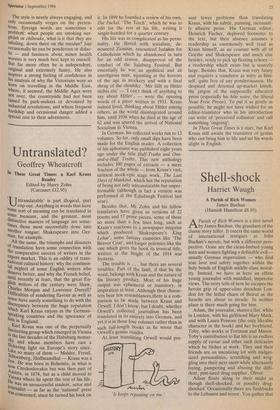Untranslated?
Geoffrey Wheatcroft
In These Great Times: a Karl Kraus Reader Edited by Harry Zohn (Carcanet £12.95) Untranslatable' is part illogical, part cop-out. Anything in words that have some sort of meaning can be translated in sOme measure, and the greatest, most distinctive masters of language are some- tunes those most successfully done into another tongue: Shakespeare into Ger- man, for example. All the same, the triumphs and disasters ef translation have some connection with the comparative success of writers in the "Port market. This is an oddity of trans- national cultural history: why the continen- tal neglect of some English writers who deserve better, and why the French belief, until recently at least, that the great En- Writers of the century were Shaw, Charles Morgan and Lawrence Durrell? bifficulties of rendering flavour as well as se.nse have surely something to do with the discrepancy between the huge reputation which Karl Kraus enjoys in the German- speaking countries and the ignorance of 10110 England. Karl Kraus was one of the perpetually !asculating group which emerged in Vienna tt,' the last decades of the Habsburg monar- C9' and whose members have cast a 11.1.cker1ng light on Europe's story since. ,tke so many of them — Mahler, Freud, iMioenberg, Hoffmansthal — Kraus was a ew- He was born in Bohemia, in what is ncv Czechoslovakia but was then part of Vistria, in 1874, but as a child Moved to Henna where he spent the rest of his life. fle was an unsuccessful student, actor and iNrrialist — as far as the 'national' press was concerned, since he turned his back on it. In 1899 he founded a review of his own, Die Fackel, 'The Torch', which he was to edit for the rest of his life, writing it single-handed for a quarter century.
His life was as complicated as his perso- nality. He flirted with socialism, de- nounced Zionism, renounced Judaism for Catholicism which he abandoned in turn for an odd reason, disapproval of the conduct of the Salzburg Festival. But essentially he was an apolitical and an unreligious man, squinting at the horrors of the age in mockery and with a final shrug of the shoulder. 'Mir fallt zu Hitler nichts em' — 'I can't think of anything to say about Hitler', — were the opening words of a piece written in 1933. Kraus indeed lived, thinking about Hitler among others, as the world disintegrated around him, until 1936 when he died at the age of 62 and was spared the arrival of National Socialism in Vienna.
In German, his collected works run to 13 volumes. So far, only small dips have been made for the English reader. A collection of his aphorisms was published eight years ago under the title Half-Truths and One- and-a-Half Truths. This new anthology includes 100 pages of extraCts — a mere fraction of the whole — from Kraus's vast, satirical mock-epic stage work, The Last Days of Mankind, which has the reputation of being not only untranslatable but unper- formable (although in fact a version was performed at the Edinburgh Festival last year).
Besides that, Mr Zohn and his fellow translators have given us versions of 22 poems and 17 prose pieces, some of these no more than a few lines long, such as Kraus's reactions to a newspaper misprint which produced 'Shakespeare's King Lehar', some fantasy causeries like 'The Beaver Coat', and longer polemics like the one which gives the book its ironical title, written at the height of the 1914 war hysteria.
The trouble is . . . but there are several troubles. Part of the fault, if that be the word, belongs with Kraus and the nature of his literary product. Most of his huge output was ephemeral or transitory, in inspiration at least. Although their charac- ters bear few resemblances,there is a com- parison to be made between Kraus and Orwell. I don't know, but I doubt, whether Orwell's collected journalism has been translated in its entirety into German, and yet it is in those four volumes rather than in such full-length books as he wrote that Orwell's genius resides.
At least translating Orwell would pre- 'It keeps repeating on me.' sent fewer problems than translating Kraus, with his subtle, punning, incessant- ly allusive prose. His German editor, Heinrich Fischer, deplored footnotes to the text, but their absence assumes a readership as enormously well read as Kraus himself, .as au courant with all of Goethe and Shakespeare and much else besides, ready to pick up fleeting echoes — a readership which exists but is scarcely large. Besides that, Kraus was very funny and requires a translator as witty as him- self, quite free of any ponderousness. He despised and detested up-market kitsch, the jargon of the supposedly educated press (especially his bete noire, the liberal Neue Freie Presse). To put it as gently as possible, he might not have wished for an editor-translator who in his introduction can write of 'perceived collusion' and call something 'ongoing'.
In These Great Times is a start, but Karl Kraus still awaits the translator of genius who can bring him to life and set his words alight in English.










































 Previous page
Previous page